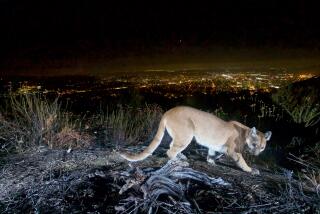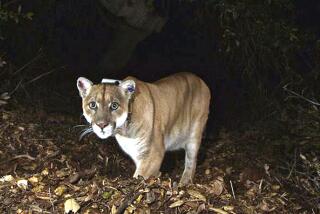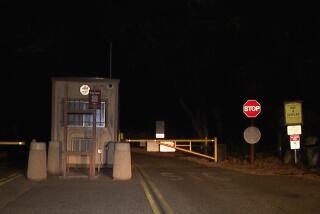Tests on DNA from suspected mountain lion attack inconclusive
DNA tests on saliva taken from the site of an apparent mountain lion attack in Perris were inconclusive, state wildlife officials said Thursday.
The quality of the samples taken from clothing worn by a homeless man who suffered major injuries last week was too poor to confirm that they were caused by a mountain lion, said Lt. Patrick Foy of the California Department of Fish and Wildlife.
The 48-year-old man is still recovering from lacerations, puncture wounds and bite marks at the base of his skull -- injuries that were described as being consistent with a mountain lion attack -- and will not be well enough for interviews for several more days, Foy said.
“We’re still trying to put all the pieces of the puzzle together, and the biggest piece of the puzzle is trying to talk to him,” Foy said.
Wildlife officials have returned to the site of attack to gather any evidence that may have been missed for additional testing, he said.
If confirmed, the incident would be the 15th verified lion attack on humans in California since 1986, according to the department. The last fatal attack was in January 2004 at Whiting Ranch Wilderness Park in Orange County. In July 2012, a 63-year-old man survived a lion attack in the Sierra Nevada foothills in Nevada County.
While the aggressive search for the animal is over, officials are maintaining a 24-hour presence in the area so they can respond to any reports of a large cat, Foy said.
“Any time this kind of thing hits the media, from housecats to yellow Labradors, they think it’s a lion,” he said, adding that the department is following up on any leads called in to the Riverside County Sheriff’s Department.
The man attacked last week was in a homeless encampment in a field near Navajo Drive and California 74 when the attack occurred. He walked to the nearest residence to call 911 on Saturday morning, but because much of the blood on his body had dried investigators believe he may have been attacked Friday.
Law enforcement officers and biologists scoured the area but were unable to locate the animal. A helicopter with heat-seeking capabilities searched the area and baited traps were set, but they were pulled back in by Monday morning.
The probability of catching the animal with traps was low, Foy said, and the effectiveness of tracking the animal with a helicopter decreases after a day or two.
In the interest of public safety, the lion will be killed if it is found, he said.
Mountain lions cannot be relocated because they can get into deadly conflicts with other lions already in the area, and sometimes a relocated lion manages to return to its original habitat, according to the department.
Twitter: @Sam_Schaefer
More to Read
Sign up for Essential California
The most important California stories and recommendations in your inbox every morning.
You may occasionally receive promotional content from the Los Angeles Times.











